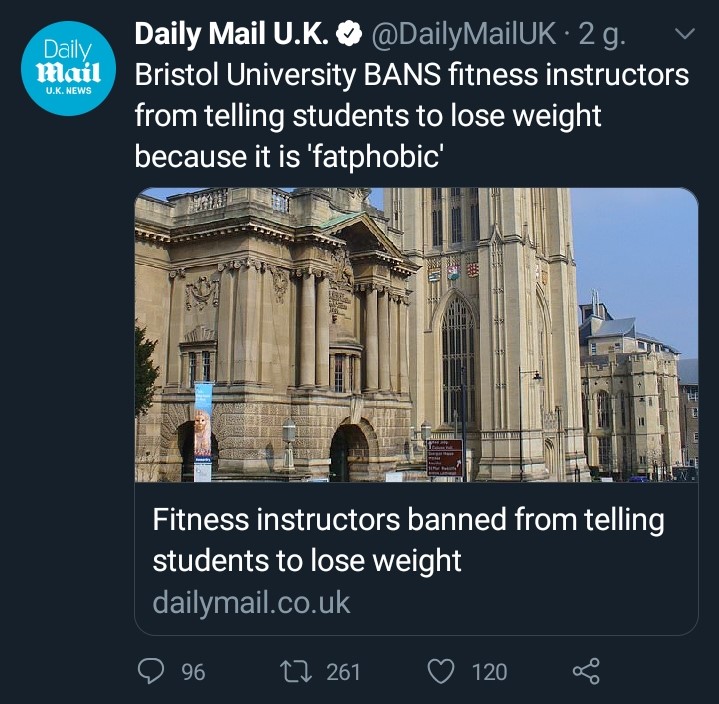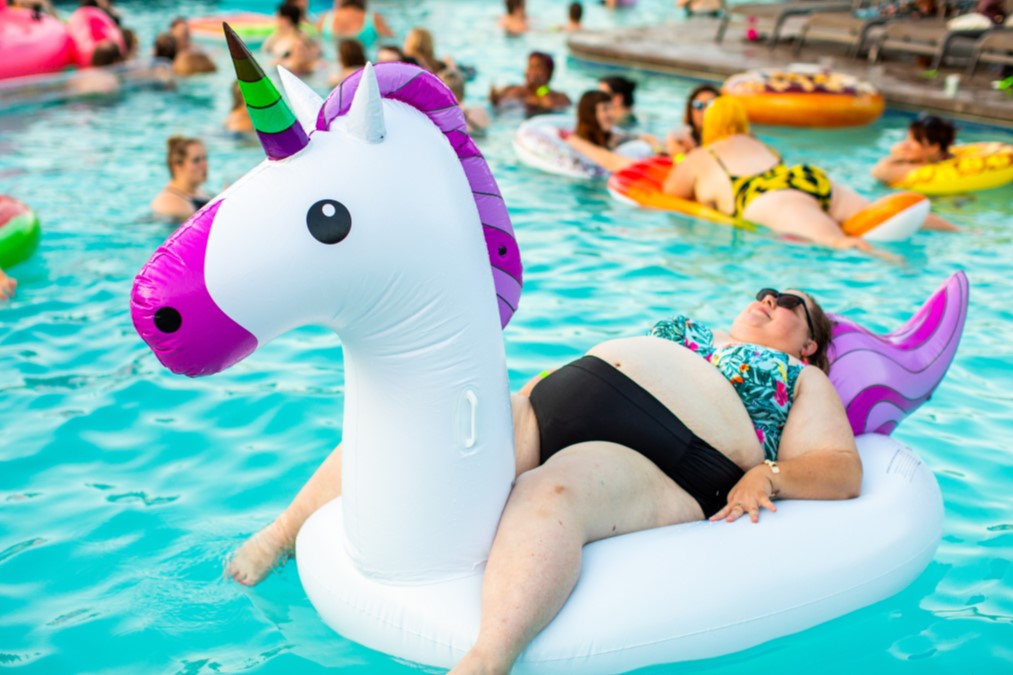Fat acceptance is a growing issue. According to WHO the number of obese individuals has tripled worldwide since 1975. As per the organization, excess weight, which can be prevented, kills more often than being underweight. You’ll also be hard pressed to find a doctor who won’t link obesity to health issues. At the same time, we see a trend of portraying excess weight as nothing to worry about. Some go as far as celebrating it, and that’s truly harmful for the body and mind. Here’s why.
Before I go any further, I feel like I owe you an explanation of why I’m dropping my two cents on the issue in the first place. Well, I used to be somewhat fat myself. Let’s say I wasn’t going on obese, but I still was far from quality life due to my condition. I can see this particularly well now, while in a decent shape and being able to compare both states. That said, it’s difficult for me to believe that someone can feel well sitting in a much deeper hole than I ever was.
On top of all that, I still love food (that is, I like to ingest amounts of calories that may not serve well a regular human), maybe even more than back when I was fat, and obviously, having a healthy relationship with food is crucial for your overall wellbeing.
Fighting obesity and its consequences costs billions of dollars each year. This is wasted money, since obesity can be prevented at a way lower cost through education, reasonable dietary habits, and physical activity.
Taking all this into account, I completely don’t understand fat acceptance and glorification. Honestly, I don’t know what’s worse of the two. If you look bad and feel bad, then why would you promote it? No one in their right mind looks at an obese person and thinks “excellent, that’s why I want too”.
I realize that the definition of good looks and feeling well are globally subjective to some extent but to me heaps of excess fat tissue, as well as resulting limited mobility and reduced physical capacity aren’t attractive in any sense of the word. I’m convinced I’m not the only person who thinks that.
I couldn’t believe that when Adele slimmed down and showed the results of her efforts online, some people were mad at her, and trust me, this is just the tip of the fat acceptance iceberg.
How is obesity promoted?
Ok, you may be unfamiliar with the issue at hand and thus wondering “What the hell is this guy talking about?! No one promotes obesity, right?”
Welp, wrong.
Fat acceptance is a social movement based on accepting and normalizing unhealthy habits and bodies.
Obesity is being put into a colorful, flamboyant packaging connoting rebellion, freedom of choice, courage, and self-acceptance. I think the first fat influencer I came across was Tess Holliday.
No amount of makeup, designer clothes, professional photos, or inspiring captions will make me admit that she’s in any way attractive and feels great on a daily basis.
I also recently came across Meg Boggs, who positions herself as obese but sporty. Let’s make something clear, raw power needed for deadlifting doesn’t have a whole lot to do with being healthy. Even the record breaking powerlifters can’t really be called healthy, and they aren’t close to having as much excess fat as these folks.
Fat acceptance can also be seen in the press and used in marketing. These contexts generate changes in language, which starts to beget phrases such as plus size model. Putting a spin on reality happens via creating positive associations with obesity, which is reflected by hashtags used in social media by fat activists:
#BodyPositivity #CelebrateYourSize #AlternativeCurves #FatGirlMagic #SelfLove #FatPositive #SelfCare #LoseHateNotWeight #FatLiberation
Read more on how language shapes reality.
Interestingly, fat acceptance seems to be aimed mainly at women.
Let’s have a look at the Calvin Klein Insta page:
I haven’t found a single photo of a fat man there, especially with a caption praising his courage in fighting social norms.
On the pop fit Men’s Health page all guys are also in shape.
On the other hand, Health Magazine for example is promoting women bodies with clear excess weight:
Why does fat acceptance exist?
Fat acceptance is a part of the body positivity movement, whose goal is to address the unrealistic beauty standards, as well as developing confidence and self-acceptance. In theory, this is indeed a noble cause, but in practice it becomes a poor attempt at solving an important issue.
Sociopolitical correctness has never been as high as in the current year.
As a rational and logical individual, I absolutely despise it. People simply aren’t equal, resources aren’t infinite, and money doesn’t grow on trees. Why does this have to be explained to grown people?!
Socipolitical correctness takes up a variety of forms, and as far as this post goes, it means that you have to keep appeasing obese people, reassuring them how beautiful, wonderful and healthy they are.
Fat shaming (which simply works, it’s helped me indeed), triggers a temporary discomfort in order to avoid a life long lasting one and is absolutely forbidden.
Telling someone they’re fat and should make changes in their life is called fatphobia and on the regular compared to historically murderous regimes. I’m not exaggerating even a bit. If you don’t believe me, you have to spend more time on Twitter.

The idea of fat acceptance and glorifying obesity is so idiotic that there has to be some other agenda behind it…
Victim mentality
An integral component of sociopolitical correctness is the victim mentality, a conviction that it’s not my fault, that it’s external factors that are responsible for my misfortune, in this case mixed with a rebellion against classic beauty standards.
Victim mentality finds application (yes, it does constitute a tool for putting pressure) in many socially problematic areas.
Actual victims of misfortune deserve all the understanding and support. If, however, you’re Black and poor in America, the richest country in the history of this planet, offering nearly endless opportunities, it’s probably your own fault, and not systemic racism. Similarly, if you’re fat, it’s not the fault of fast food chains, but your own ignorance, laziness and lack of discipline.
Yes, I know one may have certain comorbidities which significantly increase the risk of obesity but they don’t occur on a scale as big as some would like to think.
Victim mentality is almost always coupled with a demanding attitude – you accept me the way I am, I’m not planning on changing! The world is supposed to adjust to me!
Emotions and sexuality
Obese individuals, and women in particular, are surely driven by strong emotions.
I, as a guy interested in the fitness industry and watching idealized physiques daily, have to take conscious mental steps to keep my self-image and expectations intact and at a healthy level.
Now comes a controversial statement but oh well…
Men aren’t immune to vanity by no means but still invest in their bodies more due to strictly athletic reasons than women who are often driven purely by the desire to be beautiful and attractive.
What I’m trying to say here is that women are more frequently bombarded with unachievable ideals and perhaps are worse at dealing with not being able to meet them, especially since it’s this ideal they’re after in the first place, and the entire journey leading to it, which brings satisfaction to men, is of secondary nature.
In other words, if you’re a rather unattractive, obese woman being overwhelmed with hypersexualized images of unattainable physiques, perhaps you start developing an aggressive defense mechanism based on trying to normalize obesity.
I appreciate Freud, that damn Jewish junkie and erotomaniac (see how politically incorrect, yet completely true that statement is!) for his insights into the role sexuality plays in human nature and psyche. These are aspects of our existence we simply can’t escape – think, for example, of priests breaking out from celibacy.
Preferences are diverse but no man I ever spoke to has expressed interest in an obese woman. Guys like that surely exist but their fetish isn’t purely sexual either.
I’m wondering what role jealousy and certain kind of dishonesty play in all this. A thought experiment I suggest is simple. How many of the obese and supposedly content with their condition individuals would remain in their current bodies if presented with an opportunity to become fit at a touch of a magic wand?
Classic beauty exists and is difficult to attain. Otherwise it wouldn’t be held in such high regard.
If we start to consider everything to be beautiful, we’ll lose all standards and the notion itself will become meaningless. To define beauty, you need to have a reference point, a checklist.
What the heck is happening here?!
I’ve always had more questions than answers but the answers I reckon I have I try to provide. My goal is to also force you to start thinking about certain issues in a perhaps new way.
Whoever’s actually pulling the society strings doesn’t care for it to be healthy in body and mind. There’s no power or money to be made from that. If you’re paying attention to your diet and are physically active on the regular, you don’t give a damn about silly issues like being healthy at every size (HAES) and trying to convince the world that you’re right.
Fat acceptance is another method for antagonizing the society and generating illusory problems. People in shape are healthier, more agile, educated, and happier – is this the kind of society aligned with the interests of pharma companies or the entertainment industry? Is a society like that easy to manage and manipulate?
If you’re obese and happy, cool, more power to you. Please don’t try to convince the world though that this state is good and something worthy of praise.
Not everyone has to aspire to a model-type physique. Not everyone is going to be able to achieve it and that’s perfectly fine. The problem appears when millions of people show support for nicely packaged obesity.
Emotional eating is real but can’t constitute an excuse for fat acceptance. Bad mental states that can lead to obesity are also real but you know what a solution to this problem is? Owning up and losing some weight! An obese person has to take a good look deep inside themself and try to figure out what has lead to this situation, what are the reasons for such state of affairs, and then find a way to address and fix those issues.
There’s a fine line between fighting unattainable beauty standards, and simply being lazy, gluttonous and promoting something which is a problem and shouldn’t be celebrated.
Don’t let the cancel culture fool you. Fat acceptance has to go.
If you enjoyed this content, please consider supporting my work by sending a donation using a regular debit card or PayPal.

